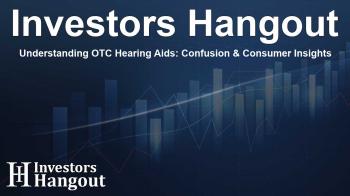Understanding OTC Hearing Aids: Confusion & Consumer Insights

Understanding the Confusion Surrounding OTC Hearing Aids
Hearing loss is becoming increasingly recognized as a significant public health challenge that impacts millions. Despite the availability of treatments, many individuals remain uninformed about their options. A recent survey conducted by the Hearing Loss Association of America (HLAA) sheds light on the current awareness and consumer sentiment regarding over-the-counter (OTC) hearing aids, a new category of hearing devices made accessible directly to consumers.
The Growing Concern of Hearing Loss
As reported, around 50 million Americans are grappling with hearing loss, a condition that is often linked to various other health issues, yet many of these individuals do not seek treatment. The lack of adequate information plays a crucial role in this trend, and HLAA's survey illustrates an urgent need for education among the public regarding OTC hearing aids. More than half of the respondents expressed confusion about these devices, highlighting the necessity of initiatives aimed at clarifying their benefits.
Survey Insights: Key Findings
HLAA's informal survey, which gathered responses from 974 participants, revealed several significant trends in attitudes towards OTC hearing aids. Conducted on HLAA’s website, the survey aimed to understand consumer habits following the introduction of OTC hearing aids. Here are some noteworthy findings:
- 89% identified as having some degree of hearing loss.
- 40% reported purchasing a prescription hearing aid.
- 15% indicated they had purchased an OTC hearing aid.
- 44% were considering making an OTC hearing aid purchase.
The survey also uncovered a strong level of awareness regarding OTC options, with 76% of respondents acknowledging the availability of these aids. However, a significant 55% reported feeling confused about how they work. With optimism about this new product class, understanding the intricacies of these devices remains vital.
HLAA's Initiative: Aims and Resources
In response to the survey findings, HLAA has organized a free educational webinar titled "OTC 101: Ask the Experts." Scheduled for a future date, this session will feature key industry experts discussing popular OTC products and answering attendee questions. HLAA's commitment to providing access to resources is evident through their ongoing efforts to foster consumer knowledge about hearing aids.
The Implications of Untreated Hearing Loss
Untreated hearing loss can lead to serious repercussions, including cognitive decline and social isolation. As underscored by HLAA Executive Director Barbara Kelley, addressing hearing loss proactively is essential for overall health. Kelley advocates for better awareness and understanding of hearing care options, stressing that no single solution fits all.
Consumer Guidance: What to Consider
As consumers navigate the process of selecting hearing aids, HLAA encourages them to consider several key factors:
- Look for products with favorable return policies.
- Be patient in finding the right device, as it often requires trying multiple options before identifying what works best.
- Connect with support networks for shared experiences and resources.
HLAA also emphasizes the importance of evaluating one’s own hearing health continuously. Regular hearing evaluations can contribute to better health outcomes and inform necessary treatment pathways.
Resources for Continued Support
In addition to the upcoming webinar, HLAA offers a plethora of resources aimed at aiding individuals with hearing loss. Their advocacy and community support foster a network where individuals can feel empowered and informed about hearing health.
The needs and experiences of those with hearing conditions are unique, and HLAA's role in providing advocacy, education, and resources is critical, fostering awareness and improving lives across the country.
Frequently Asked Questions
What are OTC hearing aids?
OTC hearing aids are devices available for direct purchase by consumers without needing a prescription, designed for adults experiencing mild to moderate hearing loss.
Why are people confused about OTC hearing aids?
The confusion often arises from varied information sources and a general lack of understanding of how these devices function compared to traditional hearing aids.
What support does HLAA provide for individuals with hearing loss?
HLAA provides advocacy, educational resources, support communities, and organizes events such as webinars to keep the public informed.
How can one prepare for attending a HLAA webinar?
Attendees can prepare by researching their questions and considering what specific information or support they seek in navigation through their hearing loss journey.
What are the benefits of using up-to-date hearing aids?
Modern hearing aids can offer better sound quality, connectivity features, and customization to individual hearing needs, helping users engage fully in their daily lives.
About The Author
Contact Kelly Martin privately here. Or send an email with ATTN: Kelly Martin as the subject to contact@investorshangout.com.
About Investors Hangout
Investors Hangout is a leading online stock forum for financial discussion and learning, offering a wide range of free tools and resources. It draws in traders of all levels, who exchange market knowledge, investigate trading tactics, and keep an eye on industry developments in real time. Featuring financial articles, stock message boards, quotes, charts, company profiles, and live news updates. Through cooperative learning and a wealth of informational resources, it helps users from novices creating their first portfolios to experts honing their techniques. Join Investors Hangout today: https://investorshangout.com/
The content of this article is based on factual, publicly available information and does not represent legal, financial, or investment advice. Investors Hangout does not offer financial advice, and the author is not a licensed financial advisor. Consult a qualified advisor before making any financial or investment decisions based on this article. This article should not be considered advice to purchase, sell, or hold any securities or other investments. If any of the material provided here is inaccurate, please contact us for corrections.

